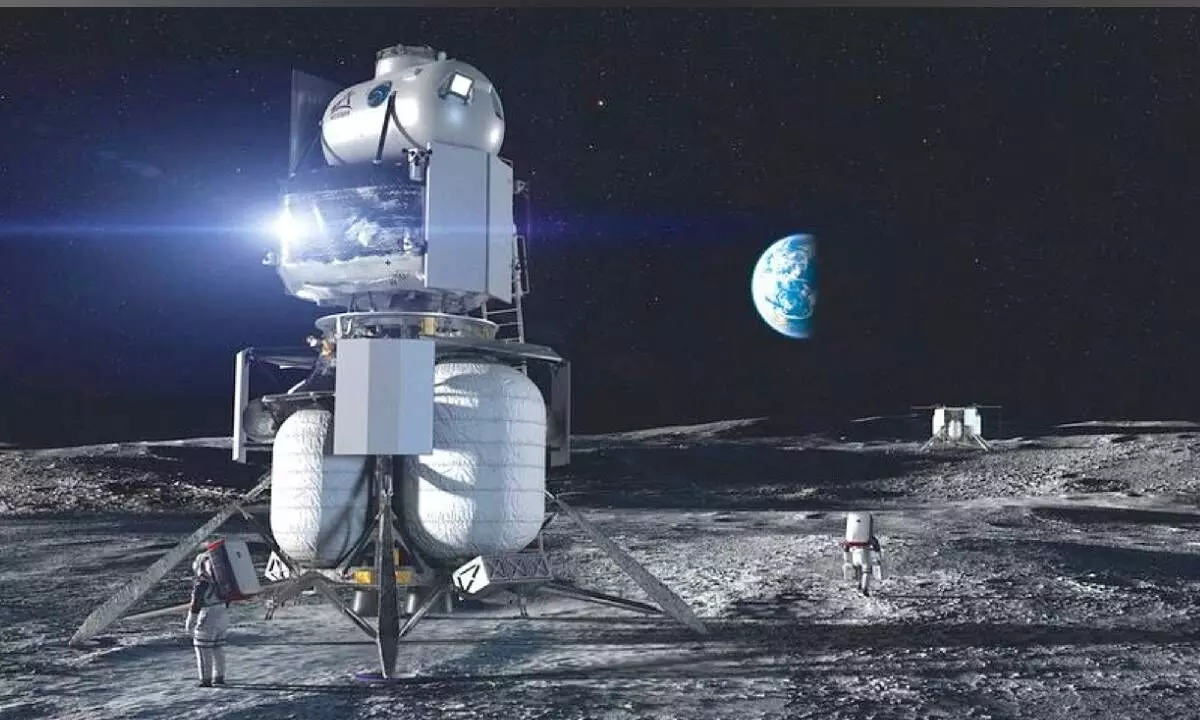Why nations in a race to dominate outer space and explore Moon?
Nations that first set up a permanent base on the Moon will have a major strategic advantage in developing new technologies and conducting in-depth research for future space exploration and development
image for illustrative purpose

The race to Moon's South Pole has kept global space agencies, space enthusiasts, the scientific community, international media and the world at large on the edge of their seats for weeks now.
Russia's Luna-25 spacecraft crashed into the Moon's surface, on Saturday, after spinning out of control, leaving Isro's Chandrayaan-3 mission as the lone warrior in the race to the 'Far Side' of the Moon. Roscomos's ( Russian space agency) failure to carry out a critical manoeuvre to place its satellite into the pre-landing orbit has turned the world's attention back to Isro's mission.
This race was akin to an F1, but in space, involving two nations and their respective Moon missions. The Chandrayaan-3 mission of the Indian Space Research Organisation(Isro) has entered into the critical stage where it will start to deboost Vikram(the lander) & Pragyan(the rover) till it safely touches the Moon's surface. Luna-25 was Russia's first Moon mission in 47 years; the last mission was in 1976 as part of the Soviet Union. The mission is to land on the uncharted south side of the Moon and, in the process, become the first nation to do so successfully.
Isro's primary objective is to ensure a successful landing on Moon. Russia turbocharged its spacecraft toward the Moon within 11 days, and Isro took 40 days to complete the same distance; this fact must have given Isro scientists some tense moments. Space enthusiasts are watching the space F1 in anticipation of who will successfully cross the checkered flag on the south side of the Moon.
For ISRO and particularly Indians worldwide, a successful touchdown on the surface of the Moon will be a moment of pride. But is there more to the space race than just landing spacecraft on the Earth's celestial neighbour? And, why is there a resurgence in interest in outer space, particularly on the Moon, among nations and private players?
Multiple objectives are fueling the race for domination of outer space. Apart from security reasons, the space economy, which includes the quest for rare metals & minerals for future research and space exploration, is the other major motivation.
Since putting a man in space and multiple lunar landings nearly six decades ago, outer space has come to be dominated by nations, such as the US, India, Russia (former Soviet Union), Japan, China & the EU, with stable economies, advanced technologies and a vision for space exploration. Bharat Gate crashed the party, on 10 July 1979, by launching its "first satellite from India using an Indian-made launch vehicle Rohini, from the Sriharikota Range, and since with every launch, it has challenged new frontiers. Be it Mangalyaan in 2013- its first Mars mission or setting a recording in 2015 by releasing 104 satellites in a single launch. In the last five years, from January 2018 to November 2022, Isro has launched 177 foreign satellites from 19 countries. The revenue generated from these launches is approximately `1,100 crore ($140 million). Going beyond space economy and domination, Bharat, as a responsibility to humankind, launched several satellites for the South Asian Association for Regional Cooperation (SAARC) nations to support a variety of purposes, including space science, education, and telemedicine. Launching satellites for SAARC nations is part of India's commitment to regional cooperation. India believes these satellites will help improve the lives of people in the region and promote economic development. India aims to be a space superpower capable of creating a space economy and allied industries to support its goal.
Quest for Rare Earth & minerals
Previous missions have shown that the Moon has many metals and minerals, including Titanium, Helium -3 and rare earth minerals. Titanium, a robust and lightweight metal, finds diverse applications in the aerospace, medical, and defence sectors. Notably, around 1 per cent of the Moon's composition is believed to be titanium. Helium-3, a scarce helium isotope, is speculated to be abundant on the lunar surface. This isotope holds immense potential as a nuclear fusion fuel, offering a pathway to clean energy generation. The Moon is considered to possess a substantial quantity of 17 essential elements, pivotal for a range of technologies, including electronics, magnets, and batteries that drive modern innovations. The Moon's resource wealth presents exciting prospects for scientific exploration and the advancement of various industries on Earth. Though, no country can occupy land on the Moon as "the Outer Space Treaty of 1967 prohibits nations from claiming sovereignty over celestial bodies, including the Moon. However, apart from placing a flag on the Moon's surface to show that they have been there, nations can claim ownership of any natural resources they extract from the Moon, such as minerals or water.
Therefore, nations that first set up a permanent base on the Moon will have a major strategic advantage in developing new technologies and conducting in-depth research for future space exploration and development. Consequently, the competition for space and the Moon's dominance is fierce and will only intensify in the coming years.
(The author is Founder of My Startup TV)

